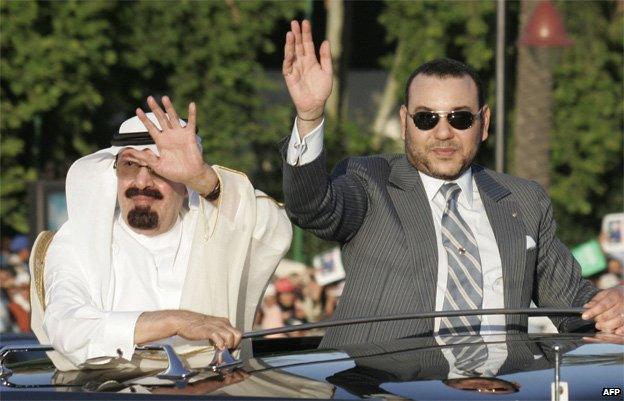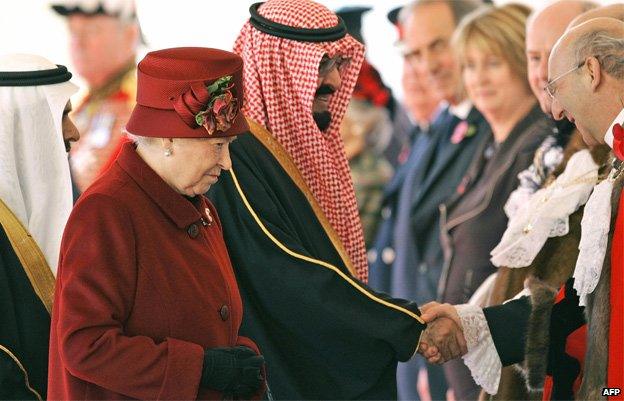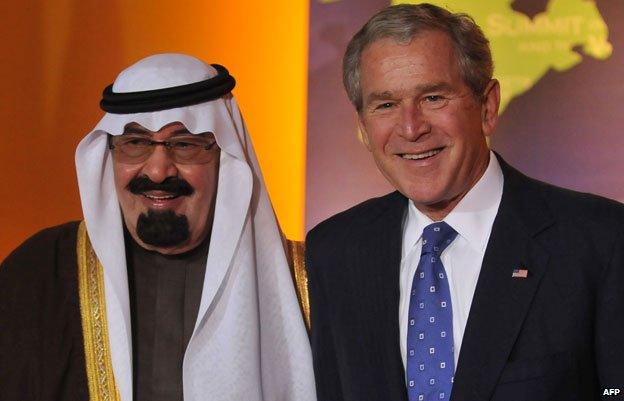Obituary: King Abdullah
- Published
King Abdullah had been in hospital suffering from a lung infection
The absolute ruler of one of the most conservative societies on Earth, King Abdullah of Saudi Arabia had to tread a narrow line between maintaining relationships with the West and appeasing opinion at home.
Raised with traditional Islamic views he was, nevertheless, seen as something of a reformer and became a vocal advocate of peace in the Middle East.
Abdullah bin Abdul Aziz Al Saud is believed to have been born in August 1924 in Riyadh, although there is some dispute about his actual birth date.
He was the 13th of at least 45 sons of King Abdul Aziz Al-Saud who created the modern state of Saudi Arabia in 1932, and gave his family name to the new country.
Countering the West
His mother, Fahda, the eighth of his father's 22 wives, was of Bedouin descent and the young Abdullah spent long periods of his childhood living traditionally in the desert.
In a strict household the young prince was brought up to follow his father's traditional views and was taught religion, literature and science by Islamic scholars at the court.
His half brother Faisal was named Prime Minister in 1958 after another half-brother, Saud, who had assumed the throne in 1953, was persuaded to relinquish control over the government.

King Abdullah tried to promote the cause of Arab unity, fostering ties with King Mohammed VI of Morocco
Abdullah's career in government began in 1961 when he was appointed mayor of the holy city of Mecca.
Two years later he became deputy defence minister and commander of the Saudi National Guard, a post he held until 2010. The body is tasked, among other duties, with guarding the Saudi royal family, and which is traditionally led by a member of the Saud family.
Under Abdullah's leadership, the Guard was increased in size and equipped with the most up-to-date weaponry.
King Faisal was assassinated in March 1975 and his successor, and brother, King Khalid, retained Abdullah's position with the National Guard and made him second deputy prime minister.
King Abdullah spoke to the BBC's John Simpson in 2007
His profile abroad increased in the 1970s when he became an outspoken critic of US policy in the Middle East and a supporter of pan-Arab unity.
Abdullah believed that it was only Arab solidarity that could make oil and Arab cash into a formidable weapon to counter the power of the West.
In 1980 Abdullah took the lead in averting war between Jordan and Syria, enhancing his status both within Saudi Arabia and in diplomatic circles abroad.
Gulf war
On the death of King Khalid, in 1982, the new monarch King Fahd appointed Abdullah as a Crown Prince and as first deputy prime minister.
His appointment was, reportedly, opposed by King Fahd's seven full brothers but Abdullah successfully negotiated the minefield of relationships in the House of Saud to secure his position.
Abdullah spoke out against violence in the Middle East stating that "we reject acts of terrorism which are aimed at undermining stability in the gulf region".
In 1991, after the Iraqi invasion of Kuwait, Abdullah was reluctant to support the stationing of US troops in Saudi Arabia, believing that negotiation with Saddam Hussein was a preferred option to war, but was overruled by King Fahd.
Ill-health
As Crown Prince he consistently supported the Palestinians although his personal relationship with the Palestinian leader Yasser Arafat was strained.
He did not hesitate to criticise the actions of Palestinian leaders, urging restraint in 1994 after a series of clashes with Israel in the Gaza Strip.

He continued Saudi Arabia's pro-Western foreign policy
In November 1995 King Fahd suffered a stroke and handed over his powers to Abdullah temporarily. Although the king officially retrieved the powers three months later, Abdullah became de facto ruler, taking on the day-to-day responsibilities of running the government.
Despite assurances that the new ruler would maintain close relationships with the US, Abdullah was determined that he would decide the direction of future alliances.
In 1997 he told a Lebanese newspaper that, while Saudi Arabia would remain friends with the US: "We can't give precedence to their interests over our interests. Our interests are those of Arabs and Muslims everywhere."
Following the 11 September 2001 attacks, Abdullah toned down Saudi Arabia's annual birthday celebrations in deference to the US but then publicly criticised what he saw as the negative media portrayal of Saudi Arabia in the wake of the attacks.
In the run-up to the US-led invasion of Iraq, the Saudis said they would not allow American planes to carry out air strikes from the Prince Sultan base in Saudi Arabia without a United Nations resolution authorising war.
Slow reform
In 2002 the Arab League adopted Abdullah's proposals for ending the Arab-Israeli conflict.
These included peace agreements with Israel in return for a full Israeli withdrawal to the pre-1967 ceasefire lines and the establishment of an independent Palestinian state.

He was sometimes a critic of US foreign policy in the Middle East
President Bush refused to endorse the plan, leading to Abdullah commenting that he felt the US leader had been poorly briefed on the details.
Abdullah announced a massive security clampdown in 2003 following the first of a series of militant attacks in Saudi Arabia.
The attacks were believed to have been caused by Islamist groups angered at the country's pro-Western stance and Abdullah vowed to quash terrorism in Saudi Arabia.
Abdullah formally succeeded to the throne in August 2005 following the death of King Fahd.
He and fellow Sunni Arab leaders were wary of the "Arab Spring" pro-democracy uprisings across the Middle East and North Africa, fearing a threat to their own rule.
Analysts say King Abdullah also sought to counter the influence of Iran, Saudi Arabia's mainly Shia rival. In Syria's bloody civil war, Iran backed President Bashar al-Assad while Saudi Arabia supported the rebels.
At home he was seen as a reformer, albeit a slow and steady one, allowing mild criticism of the government in the press, and hinting that more women should be allowed to work.
When tackled about the treatment of women in Saudi Arabia he told an interviewer: "I believe strongly in the rights of women, my mother is a woman, my sister is a woman, my daughter is a woman, my wife is a woman."
In 2011 King Abdullah extended to women the right to vote and run in future municipal elections, a move seen as potentially the most important advance for Saudi women's rights in decades.